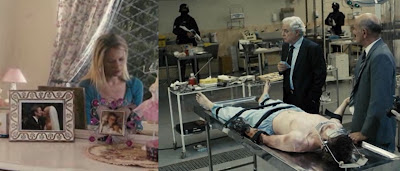In his book, The End of History, Francis Fukuyama writes:
According to Hegel, the universal and homogeneous state fully reconciles the contradiction that existed in the relationship of lordship and bondage by making the former slaves their own masters. No longer is the master recognized only by beings who are somehow less than human, and no longer are slaves denied any recognition of their humanity whatsoever. Instead, each individual, free and cognizant of his own self worth, recognizes every other individual for those same qualities. In abolishing the master-slave contradiction, something was preserved of each of the terms: both the master's freedom, and the slave's work.
Hegel's "first man" shares with animals certain basic natural desires for food, for sleep, for shelter, and above all for the preservation of his own life. He is to this extent, part of the natural or physical world. But Hegel's ""first man" is radically different from Animals in that he desires not only real, "positive" objects - a steak, or fur jacket with which to keep warm, or shelter in which to live - but also objects that are totally non-material. Above all, he desires the desire of other men, that is, to be wanted by others to be recognized.... Man is fundamentally other-directed and social animal, but his sociability leads him not to into a peaceful civil society but into a violent struggle for pure prestige. This "blood battle" can... terminate in the relationship of lordship and bondage, in which one of the contestants decides to submit to a life of slavery rather than face the risk of violent death.,The master is then satisfied because he has risked his life and received recognition for having so for having done so from another human being
I have a long personal history with Heinlein. The first book I can remember reading for my own pleasure was Heinlein's Have space Suit Will Travel (awesome). And although Heinlein was all about manly individualism (cut from the similar cloth as Ernest Hemingway's Lost Generation) and I was a super skinny arty kid, I remember liking his books a lot as an adolescent. Although I went to the same high school as Hemingway did, I never identified with the Lost Generation's bravado, who at 16 doesn't want to be a master? But I have never been mistaken for a master. I am more solidly what Francis Fukuyama calls history's "last man... men without chests":
For Nietzsche, democratic man was composed entirely of desire and reason, clever at finding ways to satisfy a host of petty wants through the calculation of long term self interest... Nietzsche believed that no true human excellence, greatness, or nobility was possible except in aristocratic societies... morality involves a distinction between better and worse, good and bad, which seems to violate the democratic principle of tolerance. It is for that reason that the last man becomes concerned above all with his own personal health and safety, because it is uncontroversial.... Men with modern educations are content to sit at home, congratulating themselves on their broadmindedness and lack of fanaticism. As Nietzsche's Zarathustra says of them, "For thus you speak"'Real are we entirely, and without belief or superstition.' Thus you stick out your chests - but alas they are hollow!"I am skipping past a lot of Fukuyama's youthful neo-con axe grinding - the Leo Straussian desire to artificially re-instill secular life with a moral religiosity I find patronizing. Fukuyama is a lapsed-neo-con, and I like to think The end of History marks the beginning of this split with the ideology of the William Kristals and Scooter Libbys of the world. While the book is loaded with pat right-wing resentment for soft-hearted liberal stuff like "cultural relativism" and "identity politics" (both of which I see as unambiguously positive developments), he rejects Nietzsche's anti-democratic morality of the rule of the strong and begrudgingly admits elsewhere that the end of history is best represented by the bureaucrats of Europe Union not the patriots of the United States (no one is willing to die for the EU). If I take exception with some of Fukuyama's attitudes, I have come to admire him as a thinker.






I just found this quote on Kevin Kelly's Technium site:
ReplyDelete"I'm glad I didn't have to fight in any war. I'm glad I didn't have to pick up a gun. I'm glad I didn't get killed or kill somebody. I hope my kids enjoy the same lack of manhood." Tom Hanks
It's a nice addendum to this post.